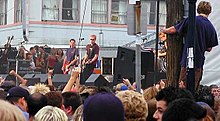Concert: Difference between revisions
No edit summary |
|||
| Line 74: | Line 74: | ||
[[uk:Концерт (захід)]] |
[[uk:Концерт (захід)]] |
||
[[zh:音樂會]] |
[[zh:音樂會]] |
||
yes i am |
|||
Revision as of 12:11, 24 September 2009


A concert is a live performance, usually of music, before an audience. The music may be performed by a single musician, sometimes then called a recital, or by a musical ensemble, such as an orchestra, a choir, or a musical band. Informal names for a concert include "show" and "gig". Concerts are held in a wide variety of settings or venues, including pubs, nightclubs, houses, barns, dedicated concert halls, entertainment centres, large multipurpose buildings, and even sports stadia. A concert held in a very large venue is sometimes called an arena concert. Regardless of the venue, musicians usually perform on a stage. Before the dominance of recorded music, concerts would be the only opportunity one would generally have to hear musicians play.
While the principal reason for a concert is the opportunity for the musicians to perform in front of an audience, even the most purely artistic of endeavors will see gains. Concerts provide the musicians exposure to the public. An attendee will probably see the musicians perform again if the concert was worthwhile. Recording artists usually go on tours to promote record sales and introduce their fans to new musical compositions. Some musicians and musical groups are known for consistently touring and holding concerts, others rarely so.
The duration of concerts vary significantly. For major concerts, it could generally take more than six hours, including support bands.
Revenue
While admission to many concerts is free, it is common practice to charge money for admission to concerts by selling admission tickets. Revenue from ticket sales traditionally goes to the performing artists, producers, and organisers. In the case of benefit concerts, a portion of profits will often go towards charity.
Revenue is also often raised through advertising, be it in free local concerts for local sponsorships, or through sponsorships from multinational corporations during major tours (e.g. 2009's "Vans' Warped Tour Presented by AT&T".) Concessions and merchandise are also often sold at concerts; often by the venue in the case of the former, and by the performing band or artist in the case of the latter.
The highest grossing concert tour of all time was the The Rolling Stones' A Bigger Bang Tour which earned approximately $558 million in between 2005 and 2007. The highest earning tour by a solo artist is the Sticky & Sweet Tour by pop artist Madonna, which earned $408 million in 2008 and 2009.
Concert tour

A concert tour is a series of concerts by a musician, musical group, or some number of either in different cities or locations. Especially in the popular music world, such tours can become large-scale enterprises that last for several months or even years, are seen by hundreds of thousands or millions of people, and bring in millions of dollars (or the equivalent) in ticket revenues. Different segments of long-lived concert tours are known as "legs". Concert tours are often administered on the local level by concert promoters or by performing arts presenters.
Types

The nature of a concert will vary by musical genre and individual groups in those genres. Concerts by a small jazz combo and a small bluegrass band may have the same order of program, mood, and volume, but vary in music and dress. In a similar way, a particular musician, band, or genre of music might attract concert attendees with similar dress, hairstyle, and behavior. For example, the hippies of the 70s often toted long hair (sometimes in dread lock form), sandals and inexpensive clothing made of natural fibers. The regular attendees to a concert venue might also have a recognizable style, comprising that venue's "scene".
Musical groups with large expected audiences can put on very elaborate and expensive affairs. In order to create a memorable and exciting atmosphere and increase the spectacle, the musicians will frequently include additional entertainment devices within their concerts. These tend to include changeable stage lighting effects and various special effect visuals, which include anything from large video screens and a Live event visual amplification system, inflatables, smoke or dry ice, pyrotechnics, artwork, pre-recorded video, and unusual attire, such as Pink Floyd, Jean Michel Jarre, Sarah Brightman and KISS. Some singers, especially in genres of popular music, augment the sound of their concerts with pre-recorded accompaniment and even broadcast vocal tracks of the singer's own voice. Activities which may take place during large-scale concerts include dancing, sing-alongs, and moshing.
Larger concerts involving a greater number of musical groups, especially those that last for multiple days, are known as festivals. Examples include the Bloodstock Open Air, Warped Tour, Wacken Open Air, Woodstock Music and Art Festival, Oxegen, Bath Festival, Salzburg Festival, the Newport Jazz Festival, Reading and Leeds Festivals,Download Festival, Parachute Music Festival, Cambridge Folk Festival, Glastonbury Festival, Roskilde Festival, Isle of Wight Festival, T in the Park, Falls Festival, Big Day Out, Rockwave Festival and Summer Sonic Festival.
See also
- Benefit concert
- Rock festival
- Recorded live track
- Guerrilla gig
- House concert
- Live PA
- Smoking concerts
- Performing arts presenters
External links
- My Concert Archive an open concert archive
yes i am
